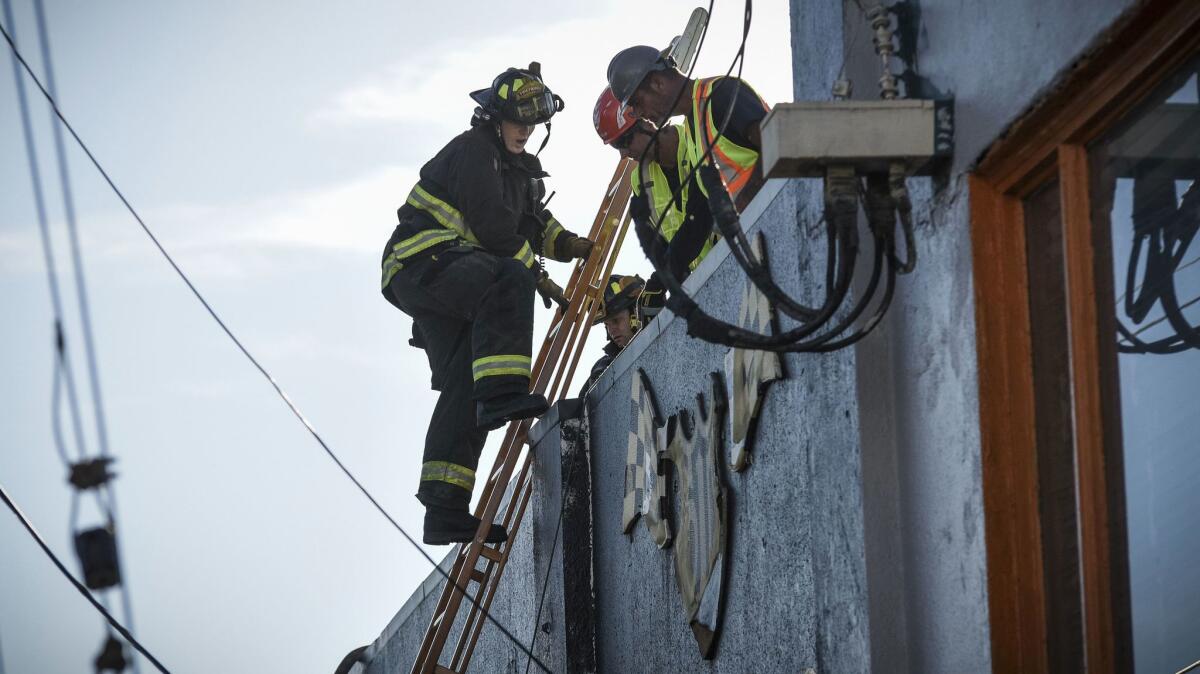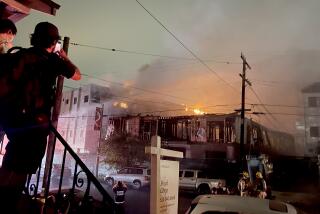Did Oakland do enough to address the many warehouse danger complaints?

The city’s planning and building department only goes into buildings when the owner seeks a permit or if officials receive a complaint.
Reporting from OAKLAND — With the search for victims of the Oakland warehouse fire complete, investigators are looking at several key questions:
- What caused the fire that killed 36 people during an unpermitted concert?
- Is there criminal liability?
- Did the city do an adequate job of inspecting the building, which had been the subject of numerous complaints over the years about health and safety problems?
Alameda County District Attorney investigators are investigating the blaze. Investigators with the Bureau of Alcohol, Tobacco, Firearms and Explosives are examining the cause. An early review pointed to some kitchen appliances possibly being an ignition point, but that report is still in its early stages.
What is the latest?
Officials said no building code enforcement inspector had been inside the warehouse in at least 30 years.
It remains unclear, however, whether a fire inspector — who works for a separate city agency — had been inside the building. The city has yet to release any fire inspection reports regarding the warehouse.
Full Coverage: Deadly Oakland warehouse fire »
What do we know about the inspection history of Ghost Ship?
The Oakland warehouse known as Ghost Ship, where the catastrophic fire broke out during a concert Friday night, was the focus of nearly two dozen building code complaints or other city actions over the past 30 years, documents released Wednesday showed.
At least three of the complaints appeared to assert that structures had been built inside the warehouse without permits or that the property was being used as a residence. Others cited illegal parking and mounds of debris piled up on the sidewalk and in an adjoining vacant lot.
An inspector who visited the warehouse 15 days before the fire to investigate a possible “illegal interior building structure” was unable to get inside.
According to Oakland Mayor Libby Schaaf, the city followed up by sending a request to the warehouse owner to gain entry. Planning and building department reports released Wednesday, however, indicate only that the city sent a violation notice demanding debris outside the building be cleaned up.

What about the records that have not yet been released?
Schaaf said the city eventually would release records of all violations and other actions related to the warehouse, documents requested by numerous news outlets under California’s public records laws.
Some city officials said it’s important to understand why the city didn’t do more about the warehouse’s conditions.
“I think we have to take responsibility, and certainly our staff members that had that task were not as responsive or assertive as necessary,” Oakland City Councilman Noel Gallo said Monday.
Were there fears from people who lived there?
Former residents have described dangerous conditions inside the building, and some said they complained to the city.
People who previously lived there recalled a building that lacked fire sprinklers and had a staircase partly made of wooden pallets. Partygoers described a rabbit warren of rooms crammed with belongings — pianos, organs, antique furniture, doors and half-finished sculptures.
“It was a tinderbox,” said Brooke Rollo, 30, who lives less than a mile from the scene and had gone to parties there.
Police were called repeatedly to the warehouse to address complaints, according to one former resident. Those reports could not be confirmed to The Times on Sunday by Oakland police.
After a December 2014 party, one partygoer notified the city Fire Department of unsafe conditions, and it was inspected, said Danielle Boudreaux, who spent time at the warehouse. She did not know the result.
Victims of the Oakland warehouse fire: Who they were »
Have some questioned whether there could have been better inspections?
Zac Unger, vice president of the local Oakland Firefighter Union, said the fire marshal’s inspection unit has been understaffed for years.
“We’re way short, especially in an aging city with a huge amount of building going on,” Unger said.
Unger said a more aggressive fire marshal’s office would scour the city looking for buildings that avoided scrutiny in the past, or had other city code violations, and might be hazardous. Such tactics could have possibly prevented the tragedy at the warehouse, he said.
“Had a fire inspector walked into that building and seen the conditions in there, they would have shut the place down,” Unger said.
What do we know about the cause of the blaze?
The fire appears to have started on the first floor, said Jill A. Snyder, special agent in charge of the ATF bureau in San Francisco. The victims were trapped and overtaken by smoke that traveled up internal stairwells.
“The fire was well-developed by the time second-floor occupants realized there was a fire going on the first floor,” she said. The building had two internal staircases connecting the top and bottom floors, but no fire exits to the outside from the second floor.
Investigators determined the warehouse was not equipped with fire alarms or a fire-suppression system, Snyder said. They also still need to determine the layout of the gutted building.
Jean M. Daly, a former arson prosecutor in Los Angeles and San Francisco who specializes in fire cases, said fire investigators study a flame’s burn patterns and intensity.
“The heavier the damage, the longer the burn, the more likely it is the area of origin,” Daly said. She added that wiring and appliances believed to be involved would undergo microscopic lab examinations.
The age of the warehouse’s wiring also will be an issue, said Robert Rowe, a former Downey Fire Department marshal.
“Back when this was a warehouse, its electrical system was designed for a particular purpose,” he said. “But modern equipment, laptops, chargers, sound systems, air conditioners and fridges place a very different burden on the system.”
MORE ON OAKLAND FIRE
‘It’s excruciating’: Inside the heartbreaking recovery of 36 bodies in Oakland warehouse
Suspects in catastrophic Oakland fire: Refrigerators, old wiring, overtaxed electrical system
More to Read
Sign up for Essential California
The most important California stories and recommendations in your inbox every morning.
You may occasionally receive promotional content from the Los Angeles Times.













